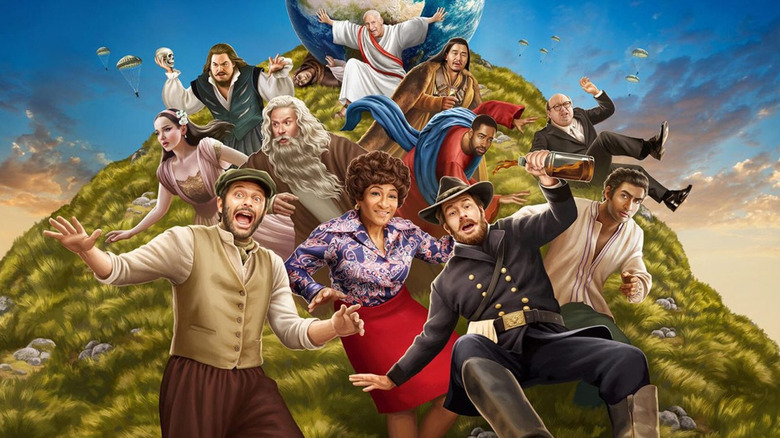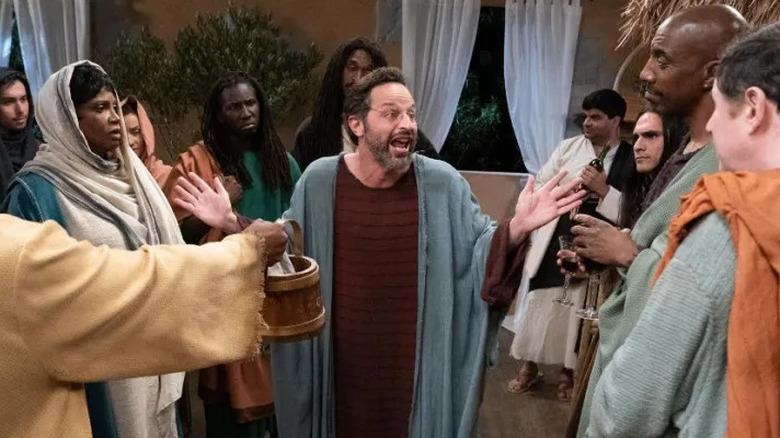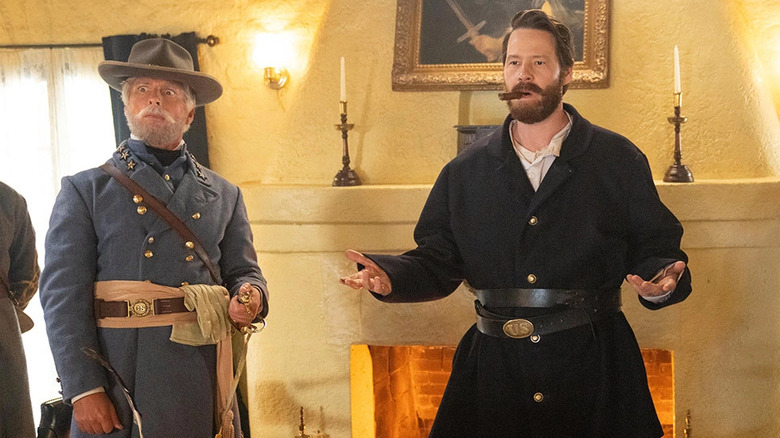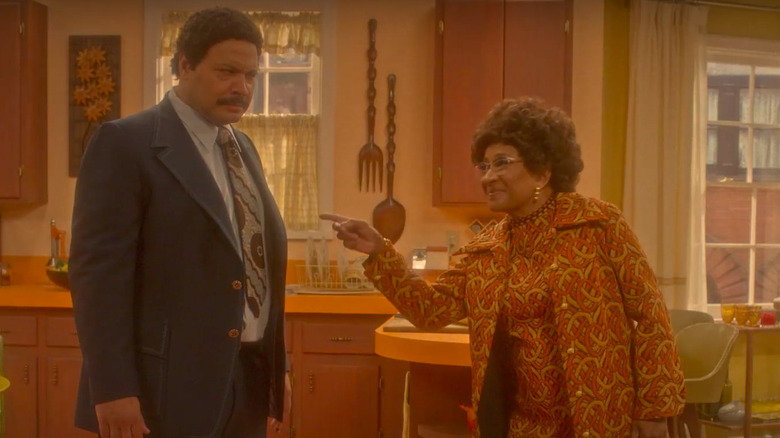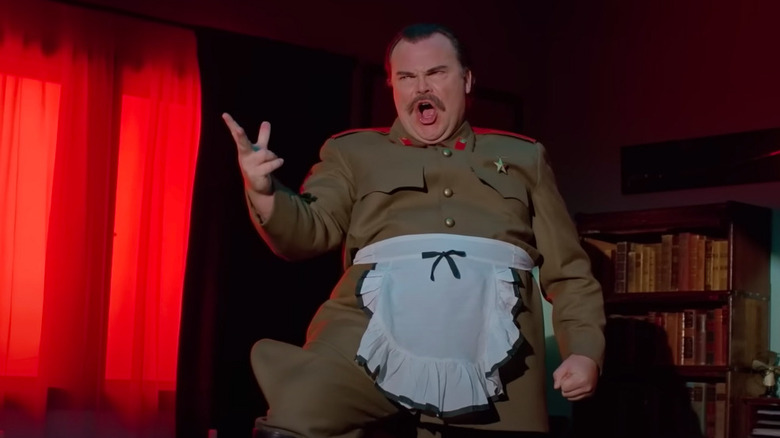History Of The World Part II Showrunner And Director On Preserving Mel Brooks' Legacy [Exclusive Interview]
Over 40 years after "History of the World Part I" hit theaters, a sequel is finally arriving in the form of a TV series on Hulu. Appropriately titled "History of the World Part II," the series follows in the footsteps of the legendary Mel Brooks by looking back at history with a contemporary comedic lens. Taking cues from the original movie, the series jumps around to different historical periods and events, such as the Biblical times of Jesus Christ, the unfolding of the Russian Revolution, the struggles of ending the Civil War, and many more. While some of the sketches are ongoing threads spread across eight episodes, there are also smaller bits involving Noah's Ark, Kublai Kahn, William Shakespeare, and Galileo.
What's great about "History of the World Part II" (watch the trailer here) is how it combines the classic style of Mel Brooks comedies with the contemporary humor of its creators. Nick Kroll, Ike Barinholtz, and Wanda Sykes are all integral to the show's creation as writers, executive producers, and stars, but it's also showrunner David Stassen and director Alice Mathias who helped shape the series. Mathias is responsible for some of the best sketch comedy of the past decade, including "I Think You Should Leave," "Portlandia," and "Documentary Now," while Stassen was an executive producer on "The Mindy Project" and a co-writer of "Central Intelligence." They all worked together to create a series that both preserved the legacy of Mel Brooks and also brought the humor of "History of the World" into the 21st century.
Leading up to the release of "History of the World Part II," we spoke with Stassen and Mathias about the process of writing the series, collaborating with Brooks, and leaning into comedic sensibilities that weren't part of their regular repertoire. There's even a Mel Brooks joke that made it into the series that the comedian has been sitting on for over 40 years.
Note: This interview has been lightly edited for clarity and brevity.
'He had a joke in his back pocket he'd been holding onto for 40 years'
What's the writing process for a show like this? With so much history as fodder for comedy, how do you determine where to focus?
Stassen: Well, we started in the summer of 2021, Nick, Wanda, and I, just talking about the big picture stuff and how we wanted to have a few tentpoles for the season. We landed on the four tentpoles: Jesus and Mary, the Civil War, the Russian Revolution, and Shirley Chisholm. We kind of ran that big picture idea by Mel, and he signed off on it and gave us some ideas. Then we got into the writers' room and explained to them, "We think it's going to go like this. We'll have these bigger, longer sketches that will be broken up, and then we're going to write just a lot of one-off sketches," like the Kama Sutra, Shakespeare, whatever else we had. Then it became a real puzzle in editing, figuring out where to put everything.
How much guidance do you get from Mel Brooks on a project like this? What's it like working with him? Whenever he talks about comedy, it just feels like he's inexplicably tapped into what makes people laugh and executes it effortlessly.
Mathias: Yeah, Mel, obviously he's fundamental to this entire undertaking, and from the very beginning has been super supportive. Taking on the role of one of the directors on a show where that's Mel Brooks's name is in the headlines –
Stassen: We should clarify. As the main director, Alice really carried the weight of the directing.
Mathias: But of course, that was wildly exciting but also really intimidating, and he made himself available to guide me and guide us along the way. He really offered to chime in if there were dilemmas that we were facing. That really meant a lot, to have his support. All the way through the end of the show, I know he's been present and paying attention, and he cares a lot about the project. That's really evident in his collaboration.
Stassen: When we were coming up with the ideas in the writing process, and we told him the Civil War idea, he had a joke in his back pocket he'd been holding onto for 40 years.
Oh, wow.
Stassen: It was where they signed the Appomattox surrender, Jack McBrayer bends over and turns, and his sword hits his three lieutenants in the groin. That was one of the first things Mel told us about the show and about "Part II." Mel's so sharp and good, he's holding onto a joke, and we're going to get to do it. To me, that kind of set the tone of like, "Oh, that's the show we're doing." We're doing the true Mel Brooks homage, so we have to try and build our comedy in that genre that Mel mastered.
'Inevitably, we are trying to uphold the legacy of Mel Brooks here...'
Yeah, I wanted to ask, especially Alice, since you've been involved in some of my favorite sketch comedy in recent years –
Stassen: Mine, too.
Mathias: Thank you, guys. That's so nice.
The show feels like a perfect blend of Nick Kroll's "Kroll Show," "Documentary Now," and "History of the World Part I." Is that something that you were conscious of, blending all that together? Or is that just your natural style that developed because of your own personal comedic tastes?
Mathias: Inevitably, we are trying to uphold the legacy of Mel Brooks here, but we're also bringing our own contemporary points of view and comedic sensibilities to the work. I think, when you watch the show, you'll see the places where we really made an attempt to make homages to the original text and things that are truly nods to his preexisting canon. But then also there's things that are just original to our own sensibilities. So it's a kind of hybrid of both.
Something I enjoyed a lot about the project was just studying his work and really trying to analyze the patterns of his instincts and the themes of his canon. Finding places where we could bring that to the table was always really exciting. Sometimes it happened and it was planned, and other times it was organic and discovered on set.
Yeah, I love when you see the little flourishes that are just purely Mel Brooks sprinkled throughout, because it's this great blend of the contemporary stuff with his. There's two really quick bits in a row I liked in the Civil War segments, when you have one of the soldiers who turns and walks the wrong way when they leave the tent on their mission. Then immediately after that, you see the two soldiers who are laying in the tent with their feet sticking out, and one just crosses their foot over the other one in that cheekily romantic way. I love the little touches like that throughout the show.
Mathias: Thanks, I think it'll be fun for the audience to find them along the way.
'I don't think there's a single sketch we shot that isn't in some way in the show'
Were there any ideas that were kicked around early on in development or the writing process that just didn't pan out or didn't feel like they worked once you got into the editing room?
Stassen: I don't think there's a single sketch we shot that isn't in some way in the show. We threw a lot at the wall. We wrote some sketches that we didn't shoot, but I don't think we shot any sketches we didn't use. Sometimes that's what I found, working on a sketch show for the first time, was you can't just have the seed of an idea and do six pages on it. Nick was great at always finding, I would say, another level to a sketch that helped us make it into something we could use.
I think we had a really funny idea about a famous Mexican Revolutionary War leader. He's doing a commercial, because one of the writers pitched that his name is now only synonymous with burrito stands. He's this great revolutionary figure. Now people just know him as a guy who owns burrito stands. I think we wrote a couple drafts of that, but we didn't get it to a place where it turned into something we shot.
I noticed that Janelle James was in the list of writers, but she doesn't appear in the series. I assume that's the same Janelle James from "Abbott Elementary," right?
Stassen: Yeah, we were lucky enough to get her to join our room, and then she got busy working on the most popular show on network TV. So we had her in the [writers'] room, and we had a couple ideas for her to be sketches, but then she had press for "Abbott," and then I think they might have started shooting while we were shooting. So we lost her after the room, but she's obviously so funny.
Do you have any hopes for historical settings or people that you would like to cover if a second season comes along? Much like "Part I," there's a teaser for a second season that acts as more of a gag. But I was curious if you guys were already kicking around ideas for new episodes.
Stassen: Alice, do you have anything you want to pitch us for the series?
Mathias: I think there's just a lot of history. So this installment, the second installment, were the first episodes of history that came to mind, but there's so much more to draw from. If we do end up doing a third installment, which I think is not even really being discussed to my knowledge, there's plenty to work with.
'I really enjoyed mining the sets, the blocking, and props for opportunities for jokes...'
It's no secret that Mel Brooks has been a huge influence on pretty much anybody who works in comedy. They've seen his movies, they know his work. Is there anything in particular that you learned from him while you were working on the show?
Mathias: For me, something that was really fun about it was embracing some of the more physical comedy that, I think leading up into this point in my career, I would've been like, "Oh, it's a little slapstick." It's kind of out of line of the tone of the work that I had done up into that point, which, to some extent, was just a little more self-serious. So I really enjoyed mining the sets, the blocking, and props for opportunities for jokes, which is just something that, up until that point, I just was never really looking for to the same extent. So I would say that was something that revisiting his work was really exciting and illuminating on set.
Stassen: I think Alice really brought a lot of that to the table when she joined us. Zahn [McClarnon], the third Civil War search party member who turns the wrong way, I'm pretty sure that was Alice's pitch. When the three of them are loading up the stuff into the wagon, and they're talking as the stuff gets smaller and smaller until they're handing spoons like it's a supply line, that was an Alice pitch. And that was, I think also from a writing side, it was fun to find that Mel Brooks comedy thing that doesn't say anything about the presidential election or politics, just fun Mel Brooks jokes. Once I saw Alice really mining that stuff, I think we all kind of were like, "Oh yeah, that's another level of the show that is maybe somewhat in the writing, but now on set we can heighten it."
Mathias: I'll have to quickly say too, it's in the trailer, but you could also use the physical kind of comedy to solve problems. I found myself in one situation with Jack Black where Stalin was about to burst into song after all his comrades leave. I was thinking, "Oh man, it would be really great if the light changed to make this feel a little bit more like 'Les Mis' with that kind of spotlight." I just remember being like, "It has to be motivated somehow," and I was like, "If it just comes out of nowhere that's corny." But then I was like, "Oh, just have him hit a button on the wall that says, 'dramatic light change.'" That feels, to me, so Mel Brooks. It's not something that I would've done in any other work leading up to this point. And it's really fun.
"History of the World Part II" premieres on Hulu starting on March 6, 2023. After that, two new episodes will drop daily, with the finale arriving on March 9.
